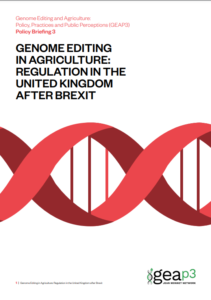- Published 18/09/20
This policy briefing was published by the GEAP3 Policy Hub

Genome editing, also known as gene editing, is a technique of genetic engineering that involves the alteration of an organism’s genetic structure by adding, deleting, changing or replacing individual nucleotides or sequences of DNA. Genome editing techniques, especially a tool known as CRISPR,1 can be used to create genetic variation that could be a source of valuable traits for crop breeding and agri-food innovation, but they are also refuelling debates about how biotechnological methods and techniques that affect agriculture and food should be governed and regulated. The contours of these debates are detailed in the first of this policy briefing series (Briefing 1).
Until 31 January 2020, the United Kingdom (UK) was a member of the European Union (EU), including the European single market. The UK is now in a short transition period (until 31 December 2020) towards a new set of relationships with its closest neighbours. Both the broad shape and the details of these new relationships are still under negotiation and various outcomes still seem possible, including a ‘no deal’ outcome, if the UK and EU member states fail to agree to new rules governing trade and other interactions between them.
The outcome of these negotiations is likely to have significant implications for the regulation of agricultural and food applications of genome editing within the UK. It is even possible that Britain’s departure from the EU might influence, directly or indirectly, the future regulation of genetically engineered products in the EU single market itself. There could also be wider ramifications for trade in agricultural and food products across the Atlantic Ocean and Mediterranean Sea. African countries that export agricultural products to the EU and UK, or which receive aid funding and technical support from the EU and UK, might be affected. This briefing explores these issues and the potential future scenarios from 2021 onwards.